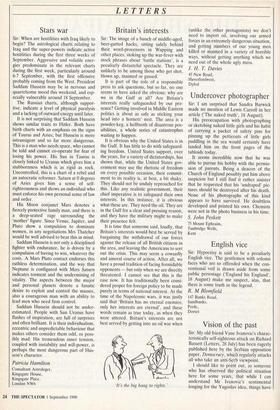Brita i n ' s interests
s nterests
Sir: The image of a bunch of middle-aged, beer-gutted hacks, sitting safely behind their word-processors in Wapping and other places, stoking up the war-fever with stock phrases about 'battle stations', is a peculiarly distasteful spectacle. They are unlikely to be among those who get shot, blown up, maimed or gassed.
It is part of the role of a responsible press to ask questions, but so far, no one seems to have asked the obvious: why are we in the Gulf at all? Are Britain's interests really safeguarded by our pre- sence? Getting involved in Middle Eastern politics is about as safe as sticking your head into a hornets' nest. The area is a powder-keg, a hellbroth of disastrous pos- sibilities, a whole series of catastrophes waiting to happen.
It is obvious why the United States is in the Gulf. It has little to do with safeguard- ing freedom. United States support, over the years, for a variety of dictatorships, has shown that, while the United States gov- ernment may use the rhetoric of freedom on every possible occasion, their commit- ment to its reality is, at best, a bit shaky. They should not be unduly reproached for this. Like any realistic government, their chief imperative is to safeguard their own interests. In this instance, it is obvious what these are. They need the oil. They are in the Gulf for a clear and pressing reason, and they have the military might to make their presence felt.
It is time that someone said, loudly, that Britain's interests would best be served by bargaining the withdrawal of our forces against the release of all British citizens in the area, and leaving the Americans to sort out the crisis. This may seem a cowardly and amoral course of action. After all, we have a proud tradition of facing formidable opponents — but only when we are directly threatened. I cannot see that this is the case now. It has traditionally been consi- dered proper for foreign policy to be made purely in terms of national interest. At the time of the Napoleonic wars, it was justly said that 'Britain has no eternal enemies; only her interests are eternal', and these words remain as true today, as when they were uttered. Britain's interests are not best served by getting into an oil war when 'It's the big bang to rights.' (unlike the other protagonists) we don't need to import oil, involving our armed forces in an extremely dangerous situation, and getting numbers of our young men killed or maimed in a variety of horrible ways, without getting' anything which we need out of the whole ugly mess.
J. H. T. Davies
45 New Road, Haverfordwest, Dyfed


















































 Previous page
Previous page